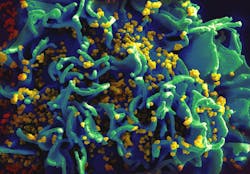The monthly dapivirine vaginal ring and daily oral pre-exposure prophylaxis (PrEP) with tenofovir disoproxil fumarate and emtricitabine were each found to be safe for HIV prevention among cisgender women who started using one of them in their second trimester of pregnancy, according to findings presented at the 2024 Conference on Retroviruses and Opportunistic Infections (CROI) in Denver. Pregnant people are estimated to be three times more likely to acquire HIV through sexual intercourse than similarly aged people who are not pregnant.
The large clinical study was conducted in South Africa, Uganda and Zimbabwe by the Microbicide Trials Network, an international research network funded by the National Institute of Allergy and Infectious Diseases (NIAID), part of the National Institutes of Health, with co-funding from the Eunice Kennedy Shriver National Institute of Child Health and Human Development and the National Institute of Mental Health.
Participants were aged 18-40 and randomized to receive the ring or oral PrEP until delivery or 41 weeks and six days, whichever came first. Of 248 pregnancies, 1% experienced stillbirth or miscarriage, 95% of deliveries were at term and 4% were preterm. Four percent of live births had congenital anomalies, none of which were related to study products. These trends and other pregnancy complications occurred at a similar frequency to a reference dataset of more than 10,000 deliveries at the same hospitals and no study participants acquired HIV.

